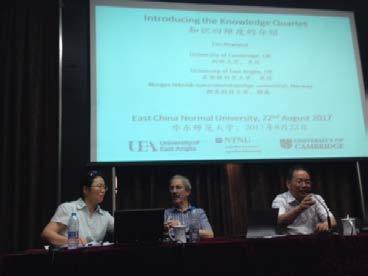
9 minute read
Tim Rowland
The Knowledge Quartet Story (Part 1)
Tim Rowland
Advertisement
Once in a while, a questionnaire of some kind asks me to state my occupation. For most of the last decade, my response has been “Unsuccessfully retired”. That happy way of life is largely due to research carried out 20 years ago, initially with friends/colleagues here in Cambridge and others elsewhere in the UK. That research was located in the field of ‘mathematics education’, but I hope that many colleagues with an interest in teaching and learning, of any kind and in any phase, will find this account of interest.
In 1997, I was working at the London Institute of Education (now a department of UCL). The Blair government was elected in May that year, with "Education, education, education" the headline mantra. Five years earlier, in a government-commissioned report, ‘three wise men’ had called for improvement of the knowledge base of mathematics teachers, and Ofsted had identified teachers’ poor subject knowledge as a contributory factor in low standards of mathematics attainment in primary schools (Ofsted, 1994). An Education Department Circular (DfEE, 1997) then set out what it considered to be the “knowledge and understanding of mathematics that trainees need in order to underpin effective teaching of mathematics at primary level”, and in September 1998, “audit and remediation” of students’ subject knowledge became statutory. The only saving grace, back in 1998 at least, was that the means of assessment (so-called ‘auditing’) of pre-service primary teachers’ knowledge was not prescribed. Drawing on a body of well-established research that had identified common ‘elementary’ mathematics errors and misconceptions, my London colleagues and I devised a 16-item instrument to assess what our students knew about the mathematics relevant to their intended careers in primary schools. We also put in place arrangements to support and assist them where ‘gaps’ appeared to have been identified (Rowland et al., 1999). Analysis of the trainees’ responses to the audit enabled us to identify aspects of mathematics, such as generalisation, that seemed to be problematic for many of our students. In a follow-up study, we found a positive association between their mathematics subject knowledge – as assessed by the audit instrument – and their competence in teaching number, as assessed by their placement supervisors.
In Autumn 1999 I was back in Cambridge. In Durham (and later, in York), Maria Goulding and her colleagues were conducting their own audit-driven research into trainees’ mathematics subject knowledge. I was now enjoying working in primary mathematics with Peter Huckstep and Anne Thwaites, then Fay Turner and Jane Warwick, and together – supported by University Research Development funding – we instigated collaborative research with our colleagues in London and York, with the acronym ‘SKIMA’ (Subject Knowledge In MAthematics). When we began, each university had its own PGCE mathematics audit procedures, but our collaboration resulted in a convergence of support and audit practices in the three institutions, with a common audit instrument. A report of our findings when we implemented the audit in our three universities (Goulding, Rowland and Barber, 2002) continues to be cited in publications on mathematics teacher knowledge.
By now, we ‘knew’ that secure mathematical knowledge, as assessed by our mathematics audit, is associated with greater competence in both the planning and the ‘delivery’ of elementary mathematics teaching. The next question needing to be answered was, of course – why is it so? In what ways is primary trainees’ teaching of mathematics – planning, reflection and classroom interaction – informed by their own knowledge and understanding of mathematics? In what ways can it be seen to ‘play out’, to make a difference, as they work with their students in the classroom?
As to what we did to investigate this question – I shall do my very best to ‘keep it brief’! From one cohort of 149 Cambridge primary PGCE students, 12 trainees were identified to represent, as a group, the gender balance in the course as a whole, their upper/lower primary specialism, and their performance on the mathematics audit. The usual ethical practices concerning consent and awareness of the purpose of their involvement were observed, with respect both to the trainees and the participating schools. Two mathematics lessons taught by each of the trainees during their final 8-week school placement were observed and videotaped. They were asked to provide a copy of their planning for the observed lesson. As soon as possible after the lesson (usually the same day) the observer/researcher wrote a brief Descriptive Synopsis of what happened in the lesson, in order to contextualise subsequent discussion of any events within it. As for the analysis of these lesson regarding the ‘manifestation’ of these trainees’ mathematics knowledge as they taught, since there was no relevant analytical theoretical framework for us to draw on back in 2002, we took a ‘bottom-up’ approach, undertaking so-called ‘grounded’ analysis of the data, following the lead of US medical sociologists Barney Glaser and Anselm Strauss some 30 years earlier. At the outset, we did not know what kind of ‘theory’ might emerge from our close scrutiny of the lesson videotapes.
It might have been an explanatory (or predictive) theory of the kind “because this teacher knew x, he or she did (or did not do) y in the lesson”. Alternatively, it might have been a ‘lens’ type of theory – a new way of seeing classroom events from the perspective of teacher knowledge. In the event, the theory that materialised was more of the second kind.
Perhaps this is the moment when I should say that our understanding of the task before us was helpfully informed and influenced by the seminal contribution of Lee Shulman, a former president of the American Education Research Association in the 1980s. Shulman heightened awareness that a significant part of knowledge-for-teaching is specific to the subject matter being taught (Shulman, 1986). So this knowledge will be different for teachers of literature, say, than that for teachers of history, or mathematics, and, in addition to knowledge of the subject matter per se, it includes knowing how best to enable a learner to come to know particular topics, processes and modes of enquiry. We were very aware of the fact that, even for the secondaryspecialist teacher, this is a special and distinctive ‘content knowledge’ dimension. For the primary-generalist, teaching across the curriculum, it will be acquired, enhanced and developed over many years. Shulman introduced the name ‘pedagogical content knowledge’ (PCK) to capture the teacher’s ability to represent and exemplify novel ideas so as to make them interesting and approachable. In Shulman’s own words, PCK includes knowledge of “ways of representing the subject which make it comprehensible to others …[and] an understanding of what makes the learning of specific topics easy or difficult” (Shulman 1986, p 9).
Beginning in October 2001, a selection of the 24 videotaped lessons was viewed by the Cambridge-based team – Anne, Peter, Fay, Jane and myself – in a number of whole-day sessions. Additional lesson videos were watched and discussed by two or three members of the team. At these meetings we identified aspects of the trainee’s ‘behaviour’ that seemed to be significant – in the limited sense that it could be construed to be informed by their mathematics content knowledge or their pedagogical content knowledge. These were located in particular moments or episodes in the lessons. At first the identification of such moments, and accounts of their significance for our research, was in the form of proposals, or conjectures, for consideration by the team. They could be challenged or supported, and retained or rejected, by consensus. Once identified, we invented and assigned a succinct label, or code, to these moments or episodes. This ‘grounded’ process generated a set of 18 codes, examples included ‘anticipation of complexity’, ‘choice of examples’, ‘identification of errors’, and ‘responding to children’s ideas’. Next, each of us viewed four or five of the lesson videos and elaborated the
Descriptive Synopsis into an Analytical Account of each lesson. In this account, significant moments and episodes were identified and assigned one (sometimes more than one) of our 18 codes, with appropriate justification and analysis concerning the role of the trainee’s content knowledge in the identified passages, and links to relevant literature. We kept a record of the number of occurrences of each code in each analytical account. By then, we knew that we had something to report! In September 2002, we made a presentation at the British Educational Research Association conference in Exeter. But it was in 2003, following many months of deliberation and debate back in Cambridge, that our most memorable breakthrough came about – a theoretical framework which we christened The Knowledge Quartet – the KQ for short.
That must be enough for now. I shall save my account of that breakthrough, its subsequent application within and beyond primary mathematics, and its adoption and influence within and beyond the UK, for another Newsletter. Suffice to say that it has been remarkable, and humbling, to see how researchers in distant parts of the world have come to appreciate what we were trying to do here back in 2003. In a recent paper (Gumiero and Pazuch, 2021) two Brazilian researchers write “Rowland, Huckstep, and Thwaites (2005) developed a theoretical analysis tool called the Knowledge Quartet (KQ), that seeks to identify the knowledge mobilized by teachers”. We had never referred to teachers’ knowledge being ‘mobilised’, but I certainly will from now on!

References
Alexander, R., Rose, J. & Woodhead, C. (1992). Curriculum Organisation and Classroom Practice in Primary Schools. London: Her Majesty’s Stationery Office. DfEE. (1997). Teaching: High Status, High Standards: Circular 10/97. London: Her Majesty’s Stationery Office. Glaser, B. G. & Strauss, A. L. (1967). The Discovery of Grounded Theory: Strategies for Qualitative Research. New York: Aldine de Gruyter. Goulding, M., Rowland, T. & Barber, P. (2002). ‘Does it matter? Primary teacher trainees’ subject knowledge in mathematics’. British Educational Research Journal 28(5) pp. 689-704. Gumiero, B. S., & Pazuch, V. (2021). Teachers Knowledge Mobilized in Geometry Lessons and Contingency Situations. International Electronic Journal of Mathematics Education, 16(1), em0620. https://doi.org/10.29333/iejme/9371 Huckstep, P., Rowland, T. & Thwaites, A. (2002). ‘Primary Teachers’ Mathematics Content Knowledge: What does it look like in the Classroom?. Proceedings of the 2002 BERA Conference: University of Exeter. Ofsted (1994). Science and Mathematics in Schools: A Review. London: Her Majesty’s Stationery Office. Rowland, T., Martyn, S., Barber, P. & Heal, C. (1999). ‘Primary Trainees Mathematics Subject Knowledge: an update report’ In E. Bills, (Ed.) Proceedings of the BSRLM Day Conference at The Open University. Coventry: University of Warwick, pp. 73-76. Rowland, T., Martyn, S., Barber, P. & Heal, C. (2000). ‘Primary teacher trainees’ mathematics subject knowledge and classroom performance’ In T. Rowland and C. Morgan, (Eds) Research in Mathematics Education Volume 2 pp. 3-18. London: BSRLM. Shulman, L.S. (1987). Knowledge and teaching: Foundations of the new reform. Harvard Educational Review, 57(1), pp. 1-22.










